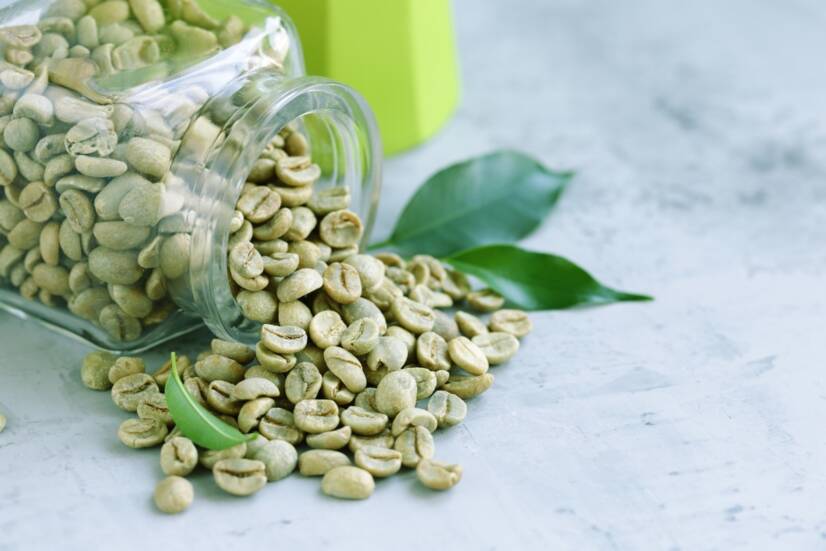- healthline.com - What Is Green Coffee? All You Need to Know. Ansley Hill, RD, LD
- pubmed.ncbi.nlm.nih.gov - The use of green coffee extract as a weight loss supplement: a systematic review and meta-analysis of randomised clinical trials.Igho Onakpoya, Rohini Terry, Edzard Ernst
- medicalnewstoday.com - How does green coffee bean extract work? Jillian Kubala, MS, RD
- medlineplus.gov - Green Coffee. MedlinePlus, National Library of Medicine
Green coffee: what are its health benefits? Facts and myths

Drinking green coffee is an increasingly popular trend in health prevention and weight loss lately. What is the difference between green and regular dark coffee? What are the facts and myths about the effects of green coffee beans?
Article content
What is "green coffee"?
Green coffee comes from the coffee beans as the fruit of the Arabic coffee tree. It is a plant that grows in tropical and subtropical regions of the Earth. The green coffee beans are found inside the stone of the fruit.
By roasting, the colour of the coffee beans changes from green to dark brown.
The difference between green coffee and classic brown coffee lies in the thermal roasting of the beans.
Green coffee is therefore a classic coffee bean that has not undergone a thermal roasting process.
Since there has been no roasting process, some substances that are beneficial to the body are retained in the green coffee bean.
However, the taste of the coffee itself loses its familiar aroma and 'coffee' taste.
Composition and effects of green coffee
Green unroasted coffee beans contain certain phenolic substances. Chlorogenic acid (CGA) is reported to be present in the highest proportion.
Chlorogenic acid is an antioxidant that promotes metabolism, reduces the absorption of sugars and fats from food and suppresses appetite. It is therefore associated with weight loss and weight reduction.
Green coffee helps in activating the detoxification process of the liver.
Chlorogenic acid has been associated with anti-inflammatory effects and beneficial effects on the prevention of atherosclerosis, high blood pressure and other cardiovascular diseases.
Other studies have attributed positive effects on diabetes mellitus or even cancer to green coffee.
Caffeine, the main component of coffee beans, is present in approximately the same amount as in dark coffee. One cup of coffee contains approximately 85 mg of caffeine.
Its effects are stimulating, energising and promote physical and mental performance.
Caffeine is an addictive stimulant (drug) for humans.
Caution: Children, pregnant women, nursing mothers, people with allergies and diabetics should especially consider drinking green coffee and consult a specialist.
Effects of green coffee:
- Supporting metabolism
- Reduction of glucose absorption
- Reduction of appetite
- Promoting liver detoxification
- Regulating high blood pressure
- Stimulating the body
- Increase physical performance
- Increase concentration
- Increase brain activity
Green coffee: facts and myths
Weight loss and weight reduction
Fact: Green coffee boosts energy metabolism and reduces appetite thanks to phenolic compounds.
Myth: Drinking green coffee helps you lose weight and reduce body weight.
If a person's goal is healthy weight loss and weight reduction, a moderate caloric deficit, energy expenditure through physical activity, and replenishing energy with a balanced healthy diet are necessary.
Due to its caffeine content, green coffee should only be drunk in the limited and recommended amount per day.
Green coffee may assist weight loss to a small extent, but without a substantial change in energy expenditure and intake, green coffee is not functional.
The same applies to dietary supplements and weight loss products containing green coffee bean extract.
Taste and aroma of coffee
Fact: Green coffee tastes different from regular coffee and its specific sour and bitter taste may not be to everyone's taste. Its taste is often compared to green tea.
Myth: Green coffee tastes and smells the same as black coffee.

Choosing, preparing and dosing green coffee
The reason for choosing green coffee is the phenolic substances. Therefore, when buying coffee, it is advisable to read the percentage of chlorogenic acid (CGA), which should be in the range of 45-50%.
The best quality supplements should not contain any other additives.
Green coffee can be purchased in the form of coffee beans, ground coffee or in the form of special coffee tablets, capsules and dietary supplements.
When stored properly, green coffee has a shelf life of several years. However, after approximately 6-12 months, there is a risk of chlorogenic acid depletion.
When buying whole bean coffee, it is of course necessary to grind the coffee. As green beans are harder than roasted beans, beware of damaging the weaker grinder. It is recommended to soak the beans in lukewarm water for at least 60 minutes before grinding.
After grinding the coffee beans, pour 2 teaspoons (approx. 7 g of green coffee) into approx. 150-300 ml of hot water, stir and leave to infuse for about 5 minutes. Then either strain the warm green coffee or drink it straight away in the manner of a 'turka'.
Do not add regular milk - this reduces the effect of the chlorogenic acid.
Green coffee is known for its sour and bitter taste. It should be flavoured with cinnamon, coconut, honey or other sweeteners as needed.
Sugar is not recommended for health prevention and weight reduction.
Daily dose of green coffee and caffeine
The exact daily dose of green coffee depends on the different active ingredient content of specific dietary supplements. It is therefore necessary to read the ingredients of each product.
A safe daily dose of caffeine should be between 150 and 400 mg, depending on a person's health and weight.
Caffeine is a good servant but a bad master.
The maximum daily dose for an adult should not exceed 400 mg of caffeine.
A single dose should not exceed 200 g of caffeine. Beware of products, sweetened drinks, teas and food supplements that contain caffeine.
Green coffee can cause the same caffeine-related side effects as traditional dark coffee.
Where is caffeine found everywhere?
- Dark coffee
- Green coffee
- Iced coffee
- Green tea
- Black tea
- Carbonated cola drinks
- Dark chocolate
- Cocoa
- Energy drinks
- Coffee sweets and desserts
Please note: Some dietary supplements, energy stimulants and especially fat burners aimed at weight loss may contain some (not small) amounts of caffeine.
The difference between green coffee and matcha tea
Due to their green colour and similar effects, ground green coffee and matcha can be confused. However, they are completely different beverages.
Matcha is a strong green tea in the form of ground powder. Matcha is obtained by processing the leaves of the tea plant, which then go through a process of steaming, drying and grinding into a fine powder.
In addition to the body-beneficial substances and antioxidants, it also contains a large amount of caffeine. It boasts a gradual release of substances with a longer lasting effect.
Studies on matcha tea, also like green coffee, have discovered a number of health benefits that promote liver protection and detoxification, cardiovascular health and stimulation of energy metabolism.
Matcha tea can be made into a hot drink that is characterised by its green colour and specific taste.
Thus, green coffee may resemble the taste of green tea, but it is a full-bodied coffee obtained from unroasted (raw) coffee beans.
Interesting resources










